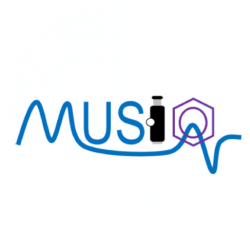Optimal vector field coupling for enhanced Coherent Raman Scattering
Position Filled
Supervisor Dr. Sophie Brasselet
Institute Fresnel
Job Description
Research program: The aim of this project is to exploit light polarization in Coherent Raman Scattering (CRS) and Second/Third Harmonic Generation (SHG/THG) microscopy to optimize the matching efficiency between optical fields and molecular vibrations as well as electronic transitions. This project will bring novel solutions to background-free nonlinear imaging with enhanced sensitivity, which is currently a challenging field. The work will benefit from the knowledge previously developed at Institut Fresnel in polarized microscopy applied to in biological samples [1] and nanomaterials [2,3]. Symmetry matching with vibration modes and distributions of oriented molecules will be implemented using circular polarizations [4] as well as fast polarization modulation schemes [5]. These schemes are promising for bio-imaging, in particular in complex scattering samples [6]. The concept will be extended to nano-objects, with the goal to achieve plasmonic enhancement by mode matching in nano-antennas. These studies will be applied to the high sensitive detection and imaging of organic molecular systems and biological samples, in particular lipid membranes.
Expected Results: The polarized microscope should achieve combined specific molecular symmetry read-out for high contrast bio-imaging, and plasmon mode matching in engineered nano-antennas, to considerably improve the specificity of the enhancement mechanism and the signal to noise read-out of molecular vibrations, with the potential of single molecule detection.
Planned secondment(s): Industrial secondments are planned APE to develop technical solutions for fast polarization control in pulsed laser sources, and Leica to enhance knowledge on state-of-the-art microscope developments. Academic secondments are planned at ICFO and Cardiff Univ. to learn about optical coupling with nanoparticle and nano-antennas, and their application in lipid membrane imaging.
Outreach activities: The PhD student will participate to the MUSIQ outreach program which is a multidisciplinary approach and format to create a large portfolio of programs and activities that target audiences in all areas of society (public fun science events, science demo in schools,…)
Enrolment in Doctoral degree: Aix Marseille University, Doctoral school ED352 ‘Physics and matter science’ (https://ecole-doctorale-352.univ-amu.fr/en)
PhD research location: The research program will take place at the Institut Fresnel, Marseille, France (www.fresnel.fr) within the interdisciplinary MOSAIC group (www.fresnel.fr/mosaic)
REFERENCES:
[1] P. Gasecka, A. Jaouen, F.-Z. Bioud, H. Barbosa de Aguiar, J. Duboisset, P. Ferrand, H. Rigneault, N. Balla, F. Debarbieux, S. Brasselet, Degradation of molecular organization of myelin lipids in autoimmune demyelination probed by polarization resolved nonlinear vibrational microscopy, Biophys. J. 113 (7), p1520–1530 (2017).
[2] N.K. Balla, C. Rendon-Barraza, L.M. Hoang, P. Karpinski, E. Bermudez, S. Brasselet, Polarized nonlinear nanoscopy of metal nanostructures, ACS Photonics 4 (2), pp 292–301 (2017).
[3] C. Rendon-Barraza, F. Timpu, R. Grange, S. Brasselet. Crystalline heterogeneity in single ferroelectric nanocrystals revealed by polarized nonlinear microscopy. Sc. Reports accepted (2019).
(4] C. Cleff, A. Gasecka, P. Ferrand, H. Rigneault S. Brasselet, J. Duboisset, Direct imaging of molecular symmetry by coherent anti-Stokes Raman scattering, Nat. Communications 7, 11562 (2016).
[5] M. Hofer, N.K. Balla, S. Brasselet, High speed polarization resolved Coherent Raman Scattering imaging, Optica 4 (7), pp. 795-801 (2017).
[6] H.B. De Aguiar, S. Gigan, S. Brasselet, Polarization recovery through scattering media, Science Advances 3 (9), e1600743; (2017).
Detailed person specification
To include necessary Bachelors / Masters qualifications
The applicant should hold a master in physics, optical, electrical or bio-engineering and show a strong interest for biology and biomedical applications.
Short description of MUSIQ
MUSIQ is an innovative European Training Network (ETN) funded by the European Union’s Horizon 2020 Marie Skłodowska-Curie Actions programme, with the unique vision of developing the next-generation optical microscopy exploiting quantum coherent nonlinear phenomena. ETNs provide training through doctoral research to talented early stage researchers (ESRs). Through 15 ESR research projects, MUSIQ will establish an intersectoral training and research programme at the physics/chemistry/life science interface with partners from 9 European countries. MUSIQ ESRs will enrol on PhD degree programmes and be employed for 36 months in a beneficiary organisation. The consortium brings together a unique team of world-leading academic groups and industry, at the forefront of optical microscopy technology developments merged with fundamental understanding of ultrafast coherent light-matter interaction phenomena, development of quantitative image analysis tools, and biomedical/pharmaceutical real-world applications. MUSIQ aims at creating the next generation of skilled well-connected scientists that will pioneer the ‘quantum microscopes of tomorrow’.
Duration of post (fixed-term for 36 months) and ideal start date
Start date: between 01/04/2019 and 01/11/2019
Duration: 36 months
Exact salary
Competitive salary plus allowances
Around: 2000€ /months
Eligibility details:
ETNs recruit a specific type of researcher (ESR). Successful candidates:
- MUST at the date of recruitment, be in the first four years (full-time equivalent research experience) of their research careers and have not been awarded a doctoral degree. ‘Date of Recruitment’ means the first day of the employment of the researcher (i.e. contract starting date). ‘Full-Time Equivalent Research Experience’ is measured from the date when the researcher obtained the degree entitling him/her to embark on a doctoral degree programme.
- MUST NOT have resided or carried out their main activity (work, studies, etc.) in the country of the recruiting organisation (FRANCE) for more than 12 months in the 3 years immediately before the recruitment date. Compulsory national service, short stays such as holidays, and time spent as part of a procedure for obtaining refugee status under the Geneva Convention are not taken into account.
Applications are encouraged from all sectors of the community, reflecting the consortium’s commitment to equality and diversity. Female candidates are especially encouraged to apply.
English language requirements –It is a requirement that network ESRs have an ability to understand and express themselves in both written and spoken English to a level that is sufficiently high for them to derive full benefit from the network training
Application
Send a full CV, a motivation letter and two reference contact person to Sophie Brasselet ([email protected]), please also send your CV with a cover Letter to the MUSIQ consortium coordinator email: [email protected]. In the cover Letter please indicate the title of the project you are applying for, and provide a brief motivation as to why you wish to become an ESR within MUSIQ. Please be aware that your CV may be shared with the named beneficiaries within the consortium, as part of the application review process, to ensure an open, transparent and merit based recruitment.
GDPR Statement
To read the full MUSIQ Data Privacy Notice, please see www.musiq-etn.eu/musiq-data-privacy-notice

